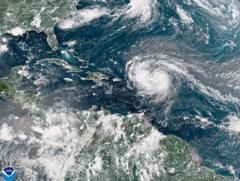Eighteen states are suing the Trump administration for halting wind energy project permits, asserting that this move jeopardizes jobs and energy advancement. The administration's order threatens established investments and has already stalled crucial projects.
Eighteen States File Suit Against Trump's Wind Energy Permit Freeze

Eighteen States File Suit Against Trump's Wind Energy Permit Freeze
The legal challenge raises concerns over job losses and energy production in the U.S. amid claims of an energy emergency.
Eighteen states have taken legal action against the Trump administration over its decision to impose a freeze on permits for wind energy projects, arguing that this pause poses a significant danger to the rapidly growing clean energy sector. New York Attorney General Letitia James, one of the attorneys general leading the lawsuit, emphasized that this halt undermines a vital source of clean, dependable, and affordable energy and jeopardizes thousands of employment opportunities and billions of dollars in investments. Furthermore, she highlighted that it stifles progress in moving away from fossil fuels known to adversely affect public health and the environment.
The administration's freeze on federal wind energy permits was detailed in an executive order signed on January 20, as part of a series of actions taken on President Trump’s first day in office. This order instructed various federal agencies to halt all assessments of permits for wind farms, directing further review of existing projects. As a consequence, state attorneys general contend that compliance with this order has placed significant financial commitments at risk and stymied new investments in renewable energy.
Recent developments include the Trump administration’s decision to cancel a critical offshore wind farm project, known as the Empire Wind project, situated off Long Island, which was poised to supply power to 500,000 homes. Although it had already secured necessary permits, criticisms arose from Interior Secretary Doug Burgum suggesting that the previous administration's analysis during the approval process may have been hastily conducted, adding to the uncertainty surrounding the future of wind energy development in the U.S.
The wind sector currently contributes around 10 percent of electricity generation nationwide and boasts numerous projects, particularly situated in the Great Plains and along the Atlantic Coast. The ramifications of this lawsuit could reverberate through the energy landscape, influencing future policies and the transition towards renewable energy resources.



















